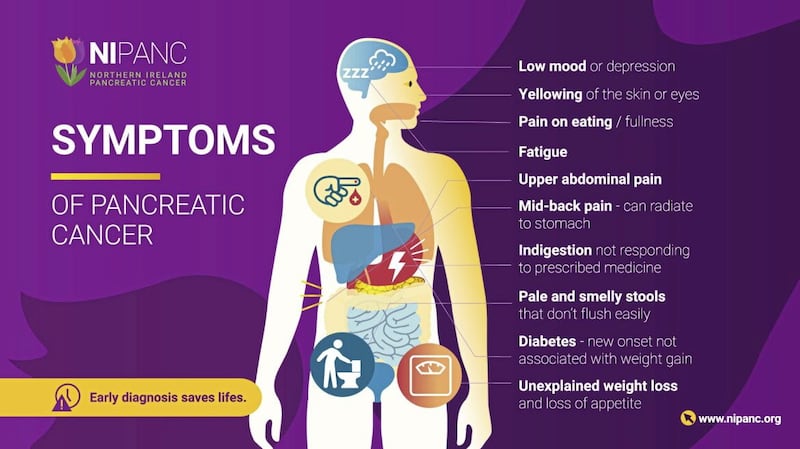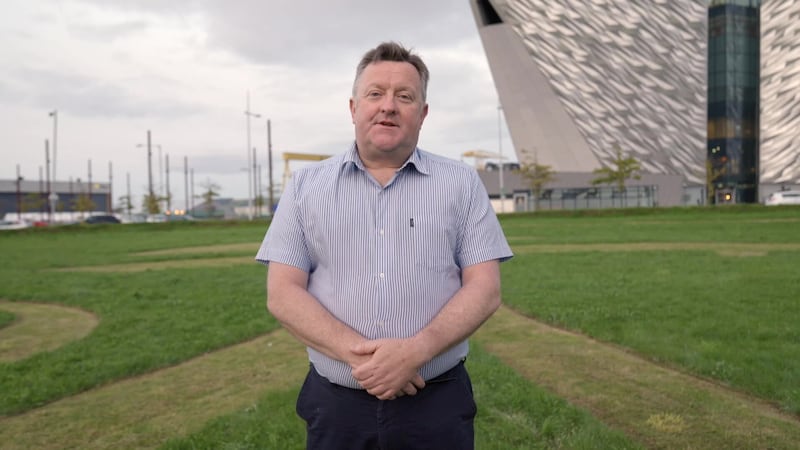Co Antrim businessman Tom Hawthorne knows he is lucky to be alive. He has had five heart attacks, suspected lung cancer, diabetes, chemotherapy and is among only five percent of people to survive a devastating diagnosis of pancreatic cancer past five years.
Tom (66), a self-confessed workaholic, and owner of Lisburn company Plastec NI, noticed symptoms six years ago in August 2017 with a dull pain in his stomach and weight loss.
“I knew something was wrong with my stomach. I have been trying to lose weight. I was cycling a lot and had taken up park running and doing really well at it. At my 60th birthday everyone was commenting on how much weight I had lost and how well I looked,” he recalls.
At the celebration, unbeknown to Tom and his family and friends, these were the first sinister signs of pancreatic cancer; a devastating and deadly disease few people survive.
Statistics published earlier this year revealed that there has been an 86% increase in confirmed cases of pancreatic cancer in the north of Ireland, rising from 152 in 2001 to 283 in 2020.
This year, as part of Pancreatic Cancer Awareness Month, local charity NIPANC is highlighting the stories of pancreatic cancer survivors not only to raise awareness of the symptoms of the disease but to show there is hope and that people can live beyond a diagnosis.
Its latest #TimeMatters campaign not only hopes to raise awareness of the disease among the general public but is also encouraging medical professionals to get to grips with the subtleties of its notoriously difficult to diagnose symptoms.
Tom believes good general fitness and a highly responsive GP were two factors critical to his survival.
“I had a pain in my shoulder and couldn’t sleep so I went to see Dr McManus who now practices at Lagan Valley Hospital in Lisburn. She thought it was a rotator cuff problem and I was given a steroid injection. While there, I mentioned a dull pain in my back radiating around to the stomach; a feeling of sickness and knowing something wasn’t right.
“I also mentioned my urine was getting darker, stools paler and they had started to float and become smelly and difficult to flush. I had had these symptoms for about two weeks. I saw her on the Friday and was called back on Monday morning at the end of August 2017. She asked me if I had been doing anything with my medication because my bloods had been tested five weeks before and the markers were all clear.”
Tom was told there were three possibilities - a gallbladder or liver problem that could be either removed or treated, or pancreatic cancer “which is not good”.
Following ultrasound and CT scans, Tom was given the news he had pancreatic cancer and due to his good level of fitness, just three weeks later the decision was taken to operate.
Leading pancreatic cancer surgeon, Professor Mark Taylor performed Whipple’s procedure - a significant operation to treat tumours and other conditions in the pancreas, small intestine, and bile ducts.
“I was taken to the theatre at 8am in the morning and came around in ICU at 8.30pm that night.
Read more:
- Finding hope through the heartache of pancreatic cancer
- Pancreatic cancer services in north must be strengthened as study shows dramatic rise in cases
“For a few days I couldn’t cope with the pain, felt depressed and was so weak. I had to sit on a chair, then walk around the ward, then corridors and finally got out in about ten days,” recalls Tom, a keen cyclist who tells others that fitness is “key to surviving oncology”.
“My wonderful GP encouraged me to get back on the bike again and, at a time when I could hardly walk but get out into the fresh air again, I started to see progress and felt much more positive.”
Three months after the operation, Tom was offered chemotherapy to halt further spread of cancer.

“Since the pancreas has been removed, I now have Type 3c Diabetes, which means I lack pancreatic enzymes important for digestion. I take Creon, a medication which helps break down and digest fats, starch and proteins in food. It’s a type of enzyme replacement therapy.”
Whilst currently doing well, Tom reveals that during a routine CT scan check-up this year, a growth was found on his lung.
“Thankfully, after a further operation it was benign. I’m the very definition of a cat with nine lives,” he smiles.

“My advice is to look after your fitness and please, please research the symptoms of pancreatic cancer. Be proactive. Don’t wait. Go to your doctor. The earlier you are diagnosed, the better the prognosis.”
Leading Hepatobiliary Surgeon, and NIPANC Trustee, Professor Mark Taylor, is delighted to be actively involved in pioneering new research into the treatment of pancreatic cancer.

“Survival of pancreatic cancer has largely remained static over the last 40 years and despite the advent of new systemic treatments, we have only made marginal progress. Novel therapies, therefore, are a major focus of research at present in trying to address the deficiencies.
“One such area is the development of micro-bubbles laced with chemotherapy that are burst by ultra-sound directly within the tumour. It’s incredible this potentially much more efficient and targeted technology is being developed locally and may provide a wonderful opportunity to improve the experience and length of treatment time for patients as well as change the terrible statistics associated with the disease.”
Symptoms of pancreatic cancer include mid-back pain, jaundice, pale and smelly stools, unexplained weight loss, fatigue and fullness. For further information visit www.nipanc.org







